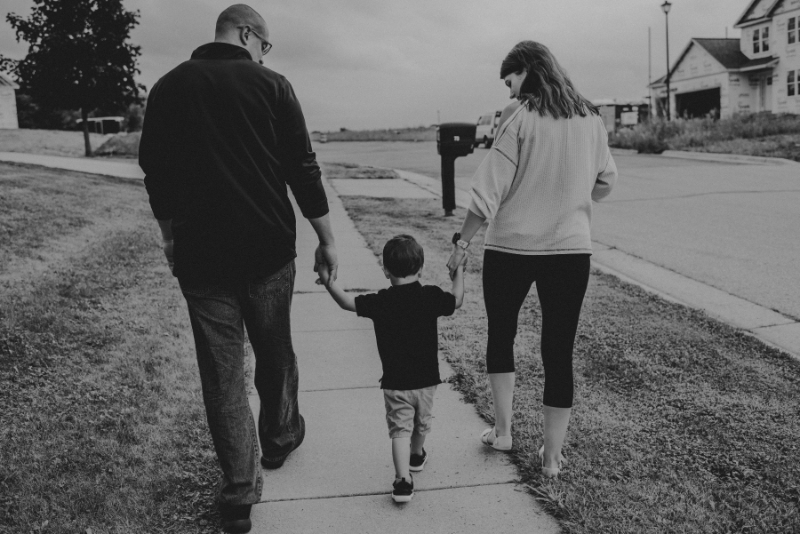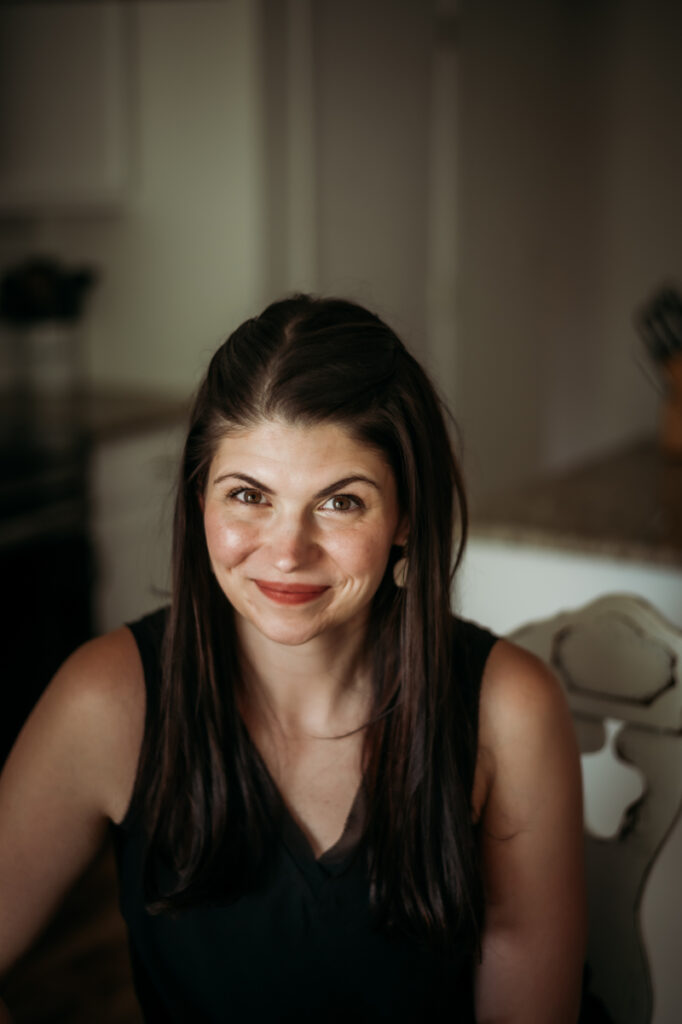Breaking the Stigma: Talking About Mental Health With Kids
July 15, 2025
When I first became a mom, I thought I needed to shield my son from anything that might seem heavy—especially topics like anxiety, sadness, or intrusive thoughts. But as someone who’s both a licensed therapist and someone who’s been through the thick of OCD and generalized anxiety myself, I’ve learned that silence doesn’t protect our kids. What does protect them? Talking about mental health early, often, and honestly.
Because here’s the truth: mental health isn’t just for grown-ups. Our kids have thoughts, feelings, fears, and inner worlds that are just as real as ours. And if we don’t help them name what they’re going through, they’ll make sense of it on their own—often with the wrong ideas (and lots of shame).
Let’s talk about why these conversations matter, how to approach it based on your child’s age, what to actually say (and what to skip), and what to do if you feel like you’ve already messed it up.

Why Talking to Kids About Mental Health Matters
Mental health awareness isn’t just a campaign slogan, it’s something we need to live out loud, especially in our own homes. Kids pick up on way more than we think. If they sense that certain topics are off-limits, they’ll either internalize the struggle or look elsewhere for answers.
When we start talking about mental health with kids, we give them permission to be human. We normalize that it’s okay to feel big feelings. And most importantly, we teach them that there’s no shame in asking for help.
Think of it like brushing their teeth, we don’t wait until there’s a cavity to talk about hygiene. We build habits early so problems don’t snowball.
By making space for these conversations, we help break the stigma, not just for our kids, but for the next generation.
Feeling stretched thin and unsure how to keep showing up for your kids? You’re not alone. Read this post for real talk on parenting through overwhelm—without losing yourself in the process.
How to Start the Conversation Based on Their Age
You don’t need a perfect script to start talking about mental health. You just need to be open and consistent. And yes, how you talk will change depending on your child’s age and development.
- For toddlers and preschoolers: Use simple, clear words to talk about feelings. “You’re feeling mad because your toy broke. That makes sense.” Help them label what’s happening inside. Books about emotions can be great tools here.
- For school-aged kids: Start adding more context. You might say, “Sometimes people feel nervous about school. I’ve felt that too.” Share age-appropriate stories from your own life. The goal is to make emotional talk normal, not a big event.
- For teens: These conversations may feel more layered (and yes, sometimes they’ll roll their eyes). But don’t let that stop you. Talk about stress, social media pressure, or how you manage anxiety. Be curious, not preachy. Ask open-ended questions: “What’s been feeling hard lately?”
And if your teen brushes you off? Keep trying. It may seem like they aren’t listening—but I promise, they’re absorbing more than you think.
If someone you care about is struggling with OCD or anxiety, it can feel overwhelming to know how to help. Here’s a guide with clear steps and compassionate advice for showing up for them (and for yourself).
What to Say (And What to Avoid)
Now let’s get into the nitty gritty: what should you actually say when talking about mental health for kids?
Here are a few helpful phrases:
- “It’s okay to have big feelings. I’m here for you.”
- “Sometimes I feel anxious too. You’re not alone.”
- “You can tell me anything. We’ll figure it out together.”
And just as important—what not to say:
- “You’re fine. Don’t worry about it.” (This can feel invalidating.)
- “There’s nothing to be scared of.” (Instead, validate the fear while still encouraging brave behavior.)
- “Stop thinking about it.” (If only it were that easy, right?)
If you’re unsure, focus on connection over correction. You don’t have to fix everything in the moment. Being present and listening can be more healing than anything else.
Worried your child’s behaviors might be signs of OCD? This blog breaks down what’s normal, what’s not, and how to trust your gut when it comes to early red flags—so you can take action sooner, not later.

Modeling Mental Health Tools in Everyday Life
Kids don’t just learn from what we say, they learn from what we do. That’s why one of the most powerful ways to support their mental health is to model your own.
When I feel anxious, I name it. I let my son see me take deep breaths. I talk out loud about what I’m doing: “I’m having a worry thought right now. I’m going to take a break and go for a walk.”
This isn’t about being perfect (I still mess this up all the time). It’s about showing your child that feelings are normal and that we have tools to handle them.
Mental health activities for kids don’t have to be complicated either. Try these simple ideas:
- Drawing a “feelings map” with colors
- Practicing belly breathing before bed
- Creating a calm-down corner with soft toys, books, or sensory items
- Naming one feeling and one coping strategy every day
These small rituals help build emotional resilience over time and they open the door for deeper conversations later.
Your emotional regulation sets the tone for your child’s. Here’s how to stay grounded during the hard moments—so you can help your child feel safe, supported, and seen.
What If You Mess It Up?
Here’s the part most parents don’t hear enough: you will mess it up sometimes. You’ll say the wrong thing. You’ll lose your temper. You might avoid a tough conversation because you’re exhausted or scared.
That’s okay. Repair matters more than perfection.
If you missed a chance to talk about something hard, circle back. “Hey, I was thinking about earlier. I wish I had said this instead…” That kind of honesty shows your child that it’s safe to be imperfect.
When we own our own growth, we model self-compassion. And that might be the most powerful mental health tip for kids, learning that they’re allowed to struggle and keep going.

Let’s Keep the Conversation Going
Breaking the stigma around mental health starts at home. It starts with the small, everyday moments when we choose to show up and listen. When we model what it means to feel hard things and still move forward.
If you’re looking for more support, I have a masterclass called “When It’s Scary Having Kids” that dives deeper into parenting through fear and anxiety. It’s packed with real-life strategies and encouragement for parents who want to raise resilient kids, without losing themselves in the process. You can check it out here.
You can also check out my OCD and Anxiety Recovery Blueprint, which breaks down the exact framework I use with clients and in my own life. If your child (or you) are struggling with mental compulsions, the Mental Compulsions Mini Course is a great next step.
Looking for something lighter but still helpful? The Break Free Deck available in my merch shop offers daily mental health reminders you can keep on your desk or share with your family.
And don’t forget—I’m always sharing tips, stories, and behind-the-scenes encouragement over on Instagram. Come join the conversation and connect with other parents who get it.
Talking about mental health doesn’t have to be perfect. It just has to be honest. And that honesty? That’s what helps our kids grow into strong, self-aware, compassionate humans.
You’ve got this. And your kids are lucky to have you leading the way.
most popular episodes
Love my podcast?
Episode 112: Postpartum OCD and False Memory OCD
Imagine how in depth I can go in an online course. Instantly downloadable and game-changing. Take the next step towards an amazing life.